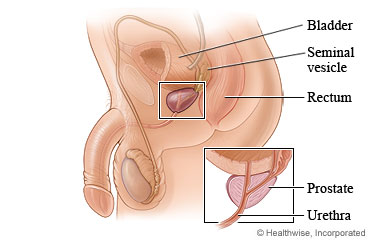Laser Transurethral Resection of the Prostate (TURP): What to Expect at
Home
Your Recovery

Transurethral resection of the prostate (TURP) is surgery to remove
prostate tissue. This is done when an overgrown prostate gland is
pressing on the urethra and making it hard to urinate.
After laser surgery, you will have a urinary catheter for a short
time. It is a flexible plastic tube used to drain urine from your
bladder when you can't urinate on your own. If it is still in place
when you go home, your doctor will give you instructions on how to
care for it.
For several days after surgery, you may feel burning when you
urinate. Your urine may be pink for 1 to 3 weeks after surgery. You
also may have bladder cramps, or spasms. Your doctor may give you
medicine to help control the spasms.
You may still feel like you need to urinate often in the weeks after
your surgery. It often takes up to 6 weeks for this to get better.
After you have healed, you may have less trouble urinating. You may
have better control over starting and stopping your urine stream.
And you may feel like you get more relief when you urinate.
After laser TURP, most people can return to work or many of their
usual tasks in a few days. But for about 2 weeks, try to avoid heavy
lifting and strenuous activities that might put extra pressure on
your bladder.
Most people still can have erections after surgery (if they were
able to have them before surgery). But they may not ejaculate when
they have an orgasm. Semen may go into the bladder instead of out
through the penis. This is called retrograde ejaculation. It does
not hurt and is not harmful to your health.
This care sheet gives you a general idea about how long it will take
for you to recover. But each person recovers at a different pace.
Follow the steps below to get better as quickly as possible.
How can you care for yourself at home?

Activity

Diet
|
|
-
You can eat your normal diet. If your stomach is upset,
try bland, low-fat foods like plain rice, broiled chicken,
toast, and yogurt.
|
|
|
-
If your bowel movements are not regular right after
surgery, try to avoid constipation and straining. Drink
plenty of water. Your doctor may suggest fiber, a stool
softener, or a mild laxative.
|

Medicines
Follow-up care is a key part of your treatment and safety. Be
sure to make and go to all appointments, and call your doctor if you
are having problems. It's also a good idea to know your test results
and keep a list of the medicines you take.
When should you call for help?
 Call 911 anytime you think you may need emergency care.
For example, call if:
Call 911 anytime you think you may need emergency care.
For example, call if:
Call your doctor now or seek immediate medical care if:
Watch closely for changes in your health, and be sure to contact
your doctor if you have problems.
Current as of: November 15, 2023
Content Version: 14.0
Care instructions adapted under license by your healthcare professional. If you have questions about a medical condition or this instruction, always ask your healthcare professional. Healthwise, Incorporated disclaims any warranty or liability for your use of this information.